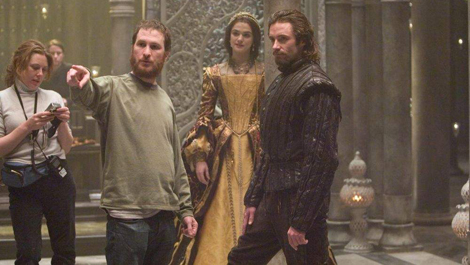Darren Aronofsky talks to Total Film
We sit down to discuss The Fountain...

You said during promotion the first time around that The Fountain may be your most personal film, but you need a bit of distance from it to decide, now you’ve had that distance…
I haven’t actually thought about it, because I’ve been off working on other stuff, so I haven’t really watched the film in a long time. It’s probably my most personal film because it lived with me for all those years, so it probably picked up so much of who I am.
I think Pi is probably pretty personal and Requiem is also. I don’t know how to do a movie and not be involved and not find something that’s connected to myself, otherwise I don’t really understand the dialogue, I don’t understand what’s going on. I don’t think it’s any different than someone else doing it, we’re all people.
The reason that film works so well is that everyone can relate to all these unique characters if they’re human. You just try and look at a character and try and find what touches you with those characters. But I think if you hang out with them for long enough they’re going to end up more and more like you.
You also said that critics had trouble fitting Requiem in with Pi and The Fountain, but aren’t they all about addiction?
I think there’s a theme of obsession and addiction that runs through the three works, there’s also a connection that a friend pointed out to me that Pi is very much about a guy in his brain, Requiem is a total physical thing, body, and The Fountain is a spiritual addiction, so it’s kind of a trilogy in its own way.
And I do feel that the three films were a chunk of work that represents the first part of my career. Hopefully I’ll get to make more films, but they work together, three parts of something that fit together. It was a trilogy of sorts for me.
What literature inspire you on The Fountain, it reminded us of classic science-fiction from the ‘50s and ‘60s…
Definitely, we definitely wanted to move science-fiction away from the techno-lust, button pushing science-fiction that we’ve been stuck with. It’s funny, this trucks in space idea, spaceships that look like trucks, people see our bubble ship, and people that aren’t sci-fi fans, they don’t get that that’s a spaceship, which to me was unexpected. Between me and my collaborators, we’ve read every great science-fiction book and every science-fiction comic-book and watched every science-fiction movie out there.
For us it was cool to make a spaceship that was organic, as opposed to another pimped-out truck in space, which back in Spaceballs Mel Brooks’ mocked. Matrix is tremendous, but the spaceship element of it was the only part that wasn’t original. You had a feeling that you’d been on this ship before, that was the only part that held it back – and that’s picking at something that’s so great.
Bringing all the latest movie news, features, and reviews to your inbox
As far as stuff that influenced us, we wanted to move science-fiction back in inner-space as opposed to outer space. Reminding people that Rod Serling is as much sci-fi as Isaac Asimov, definitely Philip K Dick was a big, big influence on all our stuff, he did for Pi and has stuck with us for a long, long time. The nice thing is, you could have Ubik or Valis as well as The Three Stigmata. But even The Three Stigmata has the big hardware and spaceships as opposed to internal struggles, and I think that internal stuff has just been lost in science-fiction.
You mention comic-books, you were keen to be involved with The Fountain comic-books, is that something you’d do again?
I liked what we did, find an artist that’s totally not connected to the visuals of the film, and have them do their own interpretation, and I hope to do that with my other projects, because it was so much fun and I think people dug it, so I’d liked to do it in the future.
Do you meditate at all – the film’s quite zen …
I don’t mediate in the traditional way, but I have my own journeying.
How hard is it to move on to Noah after such a passionate project, it sounds like a massive proposition…
We may do something small at first, Noah’s going to take a long time to pull off because of the size of it. That’s assuming they’ll let me make it, hopefully they’ll like the script and let me make it. I want to do something small, and I’m hoping to get something off this year, that’s more immediate, just to clear the palette, kind of like the sorbet course.
Sam Ashurst is a London-based film maker, journalist, and podcast host. He's the director of Frankenstein's Creature, A Little More Flesh + A Little More Flesh 2, and co-hosts the Arrow Podcast. His words have appeared on HuffPost, MSN, The Independent, Yahoo, Cosmopolitan, and many more, as well as of course for us here at GamesRadar+.


